| Srl | Item |
| 1 |
ID:
139781
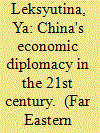

|
|
|
|
|
| Summary/Abstract |
The author takes on China's economic diplomacy, a key area of that country's foreign policy in the 21st century that includes economic rewards and coercion. She addresses, in particular, the measures Beijing is taking to make other countries heavily dependent on China. The author also discusses the significance of aid China offers in an effort to advance its foreign policy goals.
|
|
|
|
|
|
|
|
|
|
|
|
|
|
|
|
| 2 |
ID:
167777


|
|
|
|
|
| Summary/Abstract |
The article attempts to trace the evolution of the Chinese school of international relations and the influence that Qin Yaqing’s “relational theory of world politics” arising in its depths and claiming universality has on the formation and implementation of the diplomatic strategy of China’s partner relations. The process constructivism and normative requirements—the recognition by partner states of the core national interests of the PRC—act as a theoretical pattern in the article.
|
|
|
|
|
|
|
|
|
|
|
|
|
|
|
|
| 3 |
ID:
177644
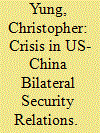

|
|
|
|
|
| Summary/Abstract |
Although the US and Chinese security relationship has been
tense for over three decades, the last three years has seen it
slide into acute crisis. The two countries are in a full-blown
security dilemma, going after each other’s “core interests,”
using their alliances and partnerships to attempt to weaken
or restrain the other, and pushing aside confidence-building measures designed to help manage the competitive
relationship. Before deriving new policy measures that can
foster habits of cooperation between the two countries, the
United States and China must create a new strategic consensus around which the bilateral security relationship can be
defined
|
|
|
|
|
|
|
|
|
|
|
|
|
|
|
|
| 4 |
ID:
117027
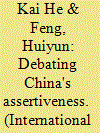

|
|
|
|
|
| Publication |
2012.
|
| Summary/Abstract |
Engaging the recent debate on China's assertive foreign policy, we suggest that it is normal for China - a rising power - to change its policy to a confident or even assertive direction because of its transformed national interests. We argue also that it is better to understand future US-China relations as a bargaining process. Whereas China negotiates for a new status in the system with redefined interests, the United States and other countries need to adjust their old political practices. China's 'core interest' diplomacy launched in 2009 is the first step in revealing 'private information' for peaceful bargaining with the outside world. A status quo foreign policy is not a wise choice for the United States because of the changing power and interest configurations in the international system.
|
|
|
|
|
|
|
|
|
|
|
|
|
|
|
|
| 5 |
ID:
137228
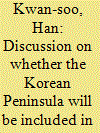

|
|
|
|
|
| Summary/Abstract |
This study aims to discuss whether the Korean Peninsula is included among the core interests claimed by China. The core interests of China are those interests that it is unwilling to negotiate over, and interests that they will even use military power to protect. China’s official core interests have so far been limited to Taiwan, Tibet and Xinjiang, but their list of core interests has been expanding in scope
since the Diaoyu/Senkaku Islands dispute. Furthermore, including the Korean Peninsula among China’s core interests leads to an immense ripple-effect on not only South Korea but also the security of Northeast Asia and U.S.-China relations. This study analyzes the following research questions: What are the core interests of China? Is the Korean Peninsula included in China’s core interests? Will the Korean Peninsula only be included in China’s core interests in the event of an emergency? If it is included, what is the specific object or likely scenario? This study conducts an in-depth analysis of the questions above and provides policy implications for the South Korean government.
|
|
|
|
|
|
|
|
|
|
|
|
|
|
|
|
| 6 |
ID:
119622
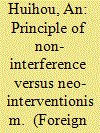

|
|
|
| 7 |
ID:
138345


|
|
|
|
|
| Summary/Abstract |
As China has grown stronger, some observers have identified an assertive turn in Chinese foreign policy. Evidence to support this argument includes the increasingly frequent evocation of China's ‘core interests’—a set of interests that represents the non-negotiable bottom lines of Chinese foreign policy. When new concepts, ideas and political agendas are introduced in China, there is seldom a shared understanding of how they should be defined; the process of populating the concept with real meaning often takes place incrementally. This, the article argues, is what has happened with the notion of core interests. While there are some agreed bottom lines, what issues deserve to be defined (and thus protected) as core interests remains somewhat blurred and open to question. By using content analysis to study 108 articles by Chinese scholars, this article analyses Chinese academic discourse of China's core interests. The authors’ main finding is that ‘core interests’ is a vague concept in the Chinese discourse, despite its increasing use by the government to legitimize its diplomatic actions and claims. The article argues that this vagueness not only makes it difficult to predict Chinese diplomatic behaviour on key issues, but also allows external observers a rich source of opinions to select from to help support pre-existing views on the nature of China as a global power.
|
|
|
|
|
|
|
|
|
|
|
|
|
|
|
|